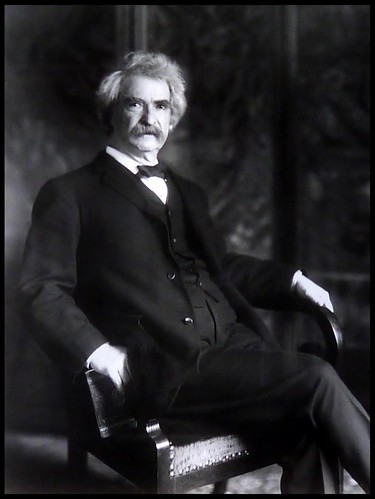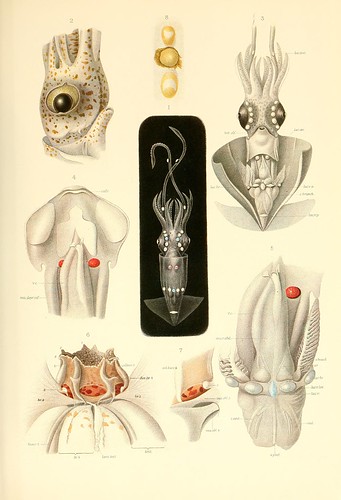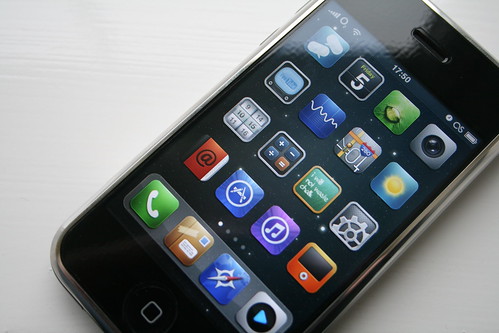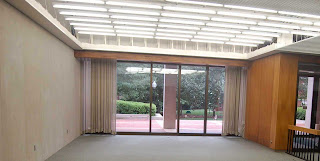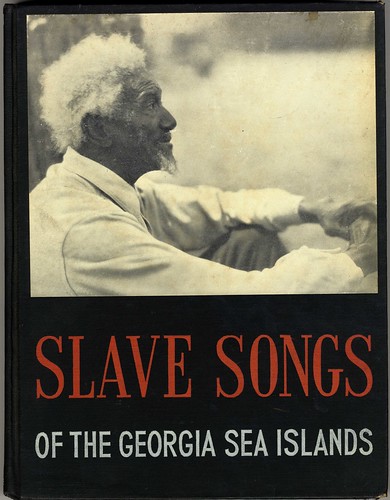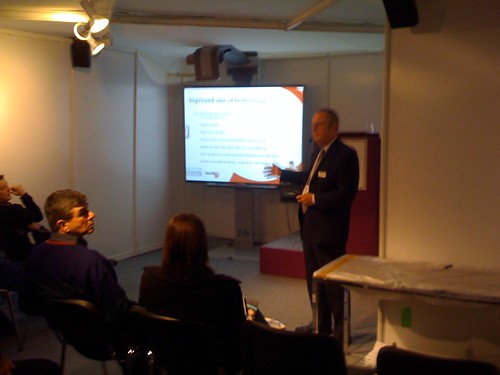12.10.2010
Extended Hours for Exam Week
Friday, Dec 10: 8am-midnight
Saturday, Dec 11: 8am-midnight
Sunday, Dec 12: 1pm - 1am
Monday, Dec 13 - Thursday, Dec 16: 8am - 1am
Friday, Dec 17: 8am - 5pm
Good luck with your exams!
New Human Rights Research Guide
In recognition of Human Rights Day, we have created a new research guide, which includes featured titles, documentaries, and films from our collection, as well as resources available on the open web.
Check out the Human Rights Research Guide
11.30.2010
Mark Twain's "Autobiography" (v.1) is available at the Teszler Library
By design of the author, the world waited 100 years for this book.
But Twain's "Autobiography" is available now at the Teszler Library - look for it on the "New Books" display shelf.
Related links:
Mark Twain Autobiography official website "This is Mark Twain" - Interactive, informative.
"Dead for a Century, Twain Says What He Meant," New York Times article, July 9, 2010.
The Autobiography of Mark Twain – review, The Guardian, November 21, 2010.
The Adventures of Samuel Clemens (review), Wall Street Journal, November 13, 2010.
11.16.2010
Yahoo Clues
Here's a brief description from Yahoo:
Yahoo! Clues lets you explore how people are using Yahoo! Search. When you enter a word or phrase in the [Find Trend] field and click Discover, you’ll see information about that search term’s popularity over time, across demographic groups, and in different locations.
You can also enter a second search term in the "Compare With" field. This will show you information on both search terms, side by side.
Or, read Search Engine Land's detailed discussion, Yahoo Clues: New Fun Search Keyword Tool.
11.02.2010
Heinitsh Drug Store Papers now available online

Earlier this year a conscientious Spartanburg citizen donated the Heinitsh Drug Store Papers to Special Collections. This collection consists of prescriptions and formulas created in the operation of the family-run drug store during the 19th century.
The Heinitsh Drug Store was opened in 1856 and the proprietor Henry Heinitsh witnessed and participated in the explosive growth of Spartanburg after the Civil War. The store, located on Morgan Square for many years, would eventually boast the first telephone in the young city.
The collection we have basically consists of two items: a re-used cotton shipment ledger book in which were pasted prescription slips for various customers, and a small notebook presumably used as a reference by the Heinitshs marked "Formula's Private" (sic). The image above is a typical prescription slip. Below is the front cover of the formula book.

And here's the inside cover and front page:

Every page from the ledger and notebook have been digitized and put online for your examination. Surely this is an interesting collection for those interested in the history of medicine and pharmacology. And we can learn a great deal about the people and times from the maladies described in the prescriptions - perhaps this collection will provide new insights about the people and events of the period.
(Thanks to the staff of the Kennedy Local History Room at the Spartanburg County Library Headquarters for assisting me in my research about the Heinitsh family and their business. The resources provided there were critical to my understanding of this collection.)
11.01.2010
Blekko, a slashtag search
"blekko is a better way to search the web by using slashtags. slashtags search only the sites you want and cut out the spam sites. use friends, experts, community or your own slashtags to slash in what you want and slash out what you don't." from Blekko. According to Blekko's site, there are three types of slashtags, user, built-in, and topic slashtags, that allow you to limit searches to a type of site or by topic.
"Blekko’s “slashtags” are a unique feature that may draw you in on occasions when you want to see how search results look when they’re skewed to a particular viewpoint... This is all done using slashtags, special keywords that you place after what your searching for, in order to indicate the viewpoint you want used to spin your results." from Search Engine Land.
"Rich Skrenta, Blekko’s co-founder and chief executive, says that since Google started, the Web has been overrun by unhelpful sites full of links and keywords that push them to the top of Google’s search results but offer little relevant information. Blekko aims to show search results from only useful, trustworthy sites... Blekko’s search engine scours three billion Web pages that it considers worthwhile, but it shows only the top results on any given topic. It calls its edited lists of Web sites slashtags." from the NY Times.
Search Blekko
10.20.2010
Library Schedule for Fall Break
Thursday 10/21: 8am – 5pm
Friday 10/22: 8:30am – 5pm
Saturday 10/23 : CLOSED
Sunday 10/24: 1pm – Midnight (Normal Schedule)
10.19.2010
New "Sandbox" Space Now OPEN!
This new space was developed with suggestions from students and, now that we have completed the space, we would like your feedback. Feel free to make comments on the flip chart in the space or to email us (askalibrarian@wofford.edu) your comments and any suggestions that you have.
10.18.2010
More Facebook privacy problems: Farmville, other games

From the Washington Post article:
Facebook admitted to a privacy breach affecting tens of millions of Facebook users this Sunday.
After a Wall Street Journal investigation, the social media network admitted that certain apps--including some from its top 10 most popular apps, such as Farmville and Texas HoldEm--had been transmitting user IDs to advertising and Internet-tracking companies.Consider your privacy settings on Facebook. The article contains a couple tips.
10.11.2010
Sandbox Nears Completion
10.07.2010
9.29.2010
Greek Manuscripts Digitisation Project
The Greek manuscripts contain unique and outstandingly rich information for researchers working on the literature, history, science, religion, philosophy and art of the whole of the Eastern Mediterranean in the Classical and Byzantine periods.
The Greek manuscripts that have been digitised provide witnesses of the rich culture of the Greek-speaking peoples from the time of the Iliad and Odyssey throughout the Hellenistic, early Christian, Byzantine and Ottoman eras and beyond. They are fundamental to understanding of the Classical and Byzantine world.
Highlights include:
* The Theodore Psalter - Produced in Constantinople in 1066, this highly illustrated manuscript of the Psalms is arguably the most significant surviving manuscript illuminated in Constantinople...
* Illuminated Gospels -A late 12th century gospel book which is rare because of its integration of images of Christ's life into the Gospels. Whereas portraits of the evangelists, Matthew, Mark, Luke and John, became a traditional feature of copies of the Gospels in Greek, narrative images were much less frequently included...
* Dialogues of Lucian - This early 10th century manuscript is the oldest surviving manuscript of the works of second-century author Lucian...
* Babrius's fables - The discovery of this manuscript on Mount Athos in 1842 gave rise to the first edition of Babrius's fables in 1844 and this manuscript remains the principal source for this text. It contains 123 Aesopic fables and was corrected by the great Byzantine scholar, Demetrius Triclinius...
* Breviarium Historicum - A late 9th-century manuscript of the history of the Byzantine Empire from the death of the Emperor Maurice in 602 to 713, by Nicephorus, Patriarch of Constantinople...
Read the full announcement
Visit The British Library Digitised Manuscripts site
And the Best File Format for Open Textbook Publishing Is . . .
- Accessibility to students
- File format used by original composer
- Collaboration needs of multiple authors (wikis work more efficiently for this)
- Revising by composers/teachers
- the Ethos of the book
9.27.2010
It's banned books week....
....Which is a great time to celebrate your right to free speech by reading what you want to read - and letting other people read what they want, too.

Here are a few of my favorites (now classics, of course) that were banned for one reason or another:
Ulysses, by James Joyce
1984, by George Orwell
Of Mice and Men, by John Steinbeck
The Grapes of Wrath, by John Steinbeck
Catch-22, by Joseph Heller
Things Fall Apart, by Chinua Achebe
A Passage to India, by E.M. Forster
Slaughterhouse Five, by Kurt Vonnegut
I know that I'd be a different person without having read these books. Do you have any favorite banned books? The answer is likely "yes" - imagine if you'd never been allowed to read your favorite books.
If you want to know more about banned books, the Teszler library has a page with links to banned books resources. Consider the list of "banned classics," which is where I found my favorites. Or look into how books are "challenged," or on what grounds books were withheld from readers.
This is such a fundamental First Amendment issue that there are many ways of considering the phenomenon; one could have a whole semester-long class on it, just as Wofford's Dr. Byrnes is doing this year.
But for us librarians, it comes down to this:

9.14.2010
Review: Barnes & Noble's nook e-reader


Awful Library Books: "The Hippy's Handbook."

"The Hippy Handbook." 1967.
Priceless subtitle: "How to live on love." Sheesh.
This is from the Awful Library Books blog, a site kept by librarians, about which they say: "This site is a collection of public library holdings that we find amusing and maybe questionable for public libraries trying to maintain a current and relevant collection. Contained in this site are actual library holdings."
Enjoy the awful.
9.08.2010
"There is nobody on the planet who knows how to make a computer mouse."
At TEDGlobal 2010, author Matt Ridley shows how, throughout history, the engine of human progress has been the meeting and mating of ideas to make new ideas. It's not important how clever individuals are, he says; what really matters is how smart the collective brain is.
What's the process that's having an effect in cultural evolution as sex is having in biological evolution? And I think the answer is exchange, the habit of exchanging one thing for another. It's a unique human feature. No other animal does it....As Adam Smith said: "No man ever saw a dog make a fair exchange of a bone with another dog."In the best TED tradition, this talk is a brainy -and slightly cheeky - romp through human history, anthropology, biology, and economics.
[When Ideas Have Sex, a TED talk by Matt Ridley.]
9.07.2010
New Drink Policy in the Library
Handheld E-Book Readers and Scholarship: Report and Reader Survey
Among the topics discussed are difficulty with format conversion, online versus handheld, loss of print page numbers in some formats and cost analysis.
From the report:
Among the staff there was some preference for the MOBI edition on the Kindle in terms of display, searching and mark-up; and for ePub on the Sony Reader for its direct touch-screen functionality.
Summarized from Digital Koans. Follow the link above to read the report.
8.19.2010
8.16.2010
8.05.2010
Construction Officially Underway
7.27.2010
Government Backs 'Jailbreaking' Of iPhones
In addition to jailbreaking, other exemptions announced Monday would:
— Allow college professors, film students and documentary filmmakers to break copy-protection measures on DVDs so they can embed clips for educational purposes, criticism, commentary and noncommercial videos.
"Gov't Unlocks Apple's iPhone But Is The Jailbreak Era Over?"
The iPhone ecosystem, which Apple protects with the ferocity of a Smoke Monster, is about to get wilder.
And we have the Library of Congress to thank for it....
What other entrenched, unimpeachable American institution will be the next to take Apple down a notch? Betty White?
7.15.2010
Gulf Oil Spill Information Center Research Guide
Gulf Oil Spill Information Center Research Guide
6.23.2010
E-books after the iPad
6.18.2010
What’s happening on the main floor of the Library?
This spring, we held design workshops with students to talk about what they needed in the library that was not currently available. Roughly 45 students participated in the conversation and we received some really great suggestions.
We shared the student suggestions with the folks at Ayers/Saint/Gross, a design firm in Baltimore, and they helped us to design a space that would address as many of those ideas as possible. We are planning to have spaces where you can plug in your laptops to a shared screen to collaborate on projects, view videos on large screens together as a group, or work on your laptop in technology-equipped lounge chairs. We’re also planning to update the look and feel of the space with better lighting, brighter colors, and more comfortable furniture. And, most of the furniture will be on wheels, so you will be able to rearrange it to meet your needs.
Here are a few sketches that the Ayers/Saint/Gross folks shared with us. We may be making some changes as construction gets underway, but these images will give you a general idea of what we’re thinking:
You may be wondering about the café tables pictured on the portico in the images. One of our librarians noticed how great it was to have the temporary tables on the portico during our design sessions and students agreed, so we’re also planning to add café tables in time for the Fall semester!
We’ll be posting photos here on the blog as the space transforms to keep you up-to-date, but feel free to stop in and check out the changes for yourself over the course of the summer!
Major Changes to OED Online
Read the letter from the editor
Visit the OED
6.17.2010
Best Anti-Plagiarism YouTube Video
6.11.2010
Multilingual WorldWideScience.org Launch Broadens Access to Global Science
"Scientific language barriers were broken today in Helsinki with the launch of Multilingual WorldWideScience.org. While a large share of scientific literature is published in English, vast quantities of high-quality science are not, and the pace of non-English scientific publishing is increasing. WorldWideScience.org will now enable the first-ever real-time searching and translation across globally-dispersed, multilingual scientific literature using complex translations technology."
"WorldWideScience.org was formally launched in 2007 with federated searching of 12 databases in 10 countries. Through early 2010, it had grown to search national scientific databases in 65 countries, covering some 400 million pages of science."
Read the DOE Announcement
Visit WorldWideScience.org
6.09.2010
200-year-old ‘tweets’ found in diaries
200-year-old ‘tweets’ found in diaries
CORNELL (US)— In reviewing volumes of diary entries—mostly written by women—from the late 18th and early 19th centuries, a researcher at Cornell University has found many terse Twitter-style records about what was happening in daily life.
Entries ranged, for example, from what was for dinner to reports of deaths, births, marriages, and travel—such as “April 7. Mr. Fiske Buried. April 27. Made Mead. At the assembly,” from the 1770 diary of Mary Vial Holyoke of Salem, Mass.
“We tend to think of new media as entirely new and different,” says Lee Humphreys, Cornell University assistant professor of communication, who has studied social media for five years. “But often we see people using new media for old problems that people have always had to think about and engage with.”
Read the entire article on Futurity
5.19.2010
Google Wave for everyone!

You can now get Google Wave without an invitation, Google announced today. If you've got a Google sign-in (such as the one you use for GMail) you'll be able to roll right into (and through) Wave's login page.
So what is Wave? Well, I don't really know since I just signed up. But it turns out that people were asking similar questions last year when the product was first rolled out:
[Google's introduction of Wave] failed to answer perhaps the fundamental question, “what do we do with it right now?,” developer Lars Rasmussen tells us. ”That’s because we weren’t sure,” he admits. People would load it up and get overwhelmed or confused. “But we know that now — it’s about groups of people adopting Wave,” he says.
Over the past year of watching usage, Rasmussen’s team concluded that the “sweet spot” for Wave is group collaboration. While these days, most sexy new services are some variety of social network where people share things, Wave is about “people getting together to get work done,” he says. And that’s the market Wave now intends to go squarely after. (via TechCrunch)
Update: You may also want to check out this article in Lifehacker, linked to in previous post about Google Wave by Sara Loree.
5.13.2010
Try This Browser Plug-In Checker Web Page
Here's the url: Plugin Check
Facebook Releases New Login Security Features
Read more here: Staying in Control of Your Facebook Logins
summarized from TechCrunch
Remember Haiti
Visit Remember Haiti
5.10.2010
It's paper-writing (and citation-building) time! Whoop-de-doo.

With the end of term comes sunshine, picnics, lounging in the sun and, oh yeah, all those big papers to write. Fun times.
And, of course, with those papers come your in-text citations, footnotes, endnotes, and the bibliography or works-cited page. We know they're not fun to build, but they are very necessary. Why?, you ask. Good question: the reason citations are important is because the person reading your paper (your professor) needs to know where you are getting your information from and, should they want to, needs to be able find the resource you cite with minimal effort.
Did you know that the library provides resources at your very fingertips for assisting you in citing your sources? It's true: check out this page that links out to guides on the various citation styles (APA, Chicago, MLA, CSE).
You may also want to consider using citation tools that can automate (read: save you time) building citations.
Remember: if you need help building a citation for a complex (read: frustrating) resource - such as an article previously published then reprinted in an anthology - ASK A LIBRARIAN for help!
Also, remember this: if you need help composing your paper, have a visit with your skilled peers in the Writing Center!
5.07.2010
Wikipedia Now Lets You Order Printed Books
Pricing is dependent upon size of book (number of pages). Value of content is left to the user to evaluate.
Read more here: Wikipedia Books
from Mashable
5.06.2010
Facebook hacked, used as instrument of social engineering in North Africa
As a result of Open Graph implementation, "Facebook's New Policies Make Harassment Easy":
"(A) group was created on Facebook (in Arabic) for the sole purpose of reporting, and thus having removed, Facebook profiles of atheist Arabs. The group, which appears to have also been removed, was entitled 'Facebook pesticide' and its sole purpose was to 'identity Atheists / Agnostic / anti-religion in the Arab world and specifically in Tunisia ...' Once identified, the group members would then attempt to report such users."
Read about it here.
5.05.2010
Google to Launch Digital Books by Early Summer
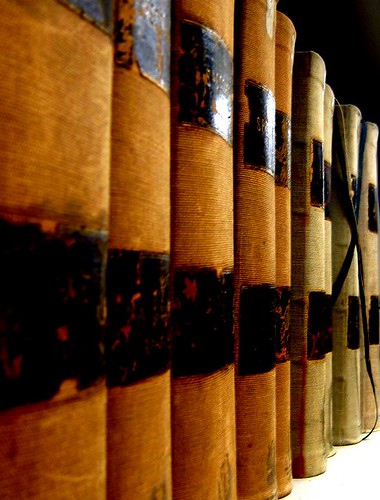
The e-book market just got more interesting - Google is entering the fray this summer.
Read about it at the Wall Street Journal.
5.04.2010
A good looking book - probably a good read, too
5.03.2010
Gulf of Mexico Oil Spill Maps and Information
+ UPDATE: New Database: Oil Spills Since 2000 (U.S.)
+ UPDATE: Gulf of Mexico – Transocean Drilling Incident
A one-stop show with the updates; maps, images, news releases, info for and from specific states, etc.
Content from: DHS; NOAA; USCG; bp; and Transocean.A Twitter Stream and Facebook page from DeepwaterHorizon are are also available.
+ Gulf of Mexico Oil Spill Map – Forecast through May 3 (NOAA)
+ Gulf of Mexico Oil Spill – Maps and Images (U.S. Coast Guard)
+ Gulf of Mexico Oil Spill [map updated each evening] (NOAA)
Note: Make sure to scroll to the bottom of the page for MANY MORE resources.Source: NOAA, USCG (via THE WONDERFUL Perry-Castañeda Library Map Collection at the University of Texas at Austin)
Need a geographic related map? You can usually find it at Perry-Castañeda Web Site
via Resource Shelf.
4.28.2010
Facebook, Open Graph, and your privacy
What this all really comes down to is the almost instant ubiquity of the "Like" button. (You may have noticed that your Facebook friends seem to be "liking" more lately.)
So, is this all cool with you? Maybe, right? Personally, I think the automatic opt-in is a little presumptuous (if not downright scary), so instead of clicking through, I actually check to see how Facebook is using me. (Full disclosure: I agree with Molly Wood when she says "I hold few illusions that Facebook's business strategy has ever been about anything other than building up a huge user base and then selling ads to those users." That said, I am also a pretty avid Facebook user. "Hypocrite auteur!")
Short of entirely deleting your Facebook account, you can actually protect yourself quite well. Here's a decent (and short) video on how to toggle your privacy settings:
For all you "reading types" out there, here are (one, two) text-based guides to protecting your privacy.
Oh, and apparently this whole thing has gone political, with some Senators making noises about the new initiative.
4.27.2010
Help us redesign part of the library!
**UPDATE: If you weren't able to make it to our design brainstorming sessions on Tuesday night, please feel free to stop by the reference desk or email askalibrarian@wofford.edu for more information or to share your ideas.
We Have Met the Enemy and He Is PowerPoint
From today's (27 April 2010) New York Times, an article on society's prevalent presentation software, Microsoft's PowerPoint, and its use, misuse, and abuse in the military.
“PowerPoint makes us stupid,” Gen. James N. Mattis of the Marine Corps, the Joint Forces commander, said this month at a military conference in North Carolina. (He spoke without PowerPoint.) Brig. Gen. H. R. McMaster, who banned PowerPoint presentations when he led the successful effort to secure the northern Iraqi city of Tal Afar in 2005, followed up at the same conference by likening PowerPoint to an internal threat
Richard C. Holbrooke, the Obama administration’s special representative for Afghanistan and Pakistan, was given PowerPoint briefings during a trip to Afghanistan last summer at each of three stops — Kandahar, Mazar-i-Sharif and Bagram Air Base. At a fourth stop, Herat, the Italian forces there not only provided Mr. Holbrooke with a PowerPoint briefing, but accompanied it with swelling orchestral music.
President Obama was shown PowerPoint slides, mostly maps and charts, in the White House Situation Room during the Afghan strategy review last fall.
Commanders say that the slides impart less information than a five-page paper can hold, and that they relieve the briefer of the need to polish writing to convey an analytic, persuasive point. Imagine lawyers presenting arguments before the Supreme Court in slides instead of legal briefs. (emphasis added)
Want to try something different? Consider Prezi for your next presentation.
4.26.2010
2010 State of America’s Libraries Report
- Internet use continues to expand at public libraries, which have seen double-digit growth since 2007 in the on-line services they make available to their patrons.
- Ninety-six percent of Americans feel that school libraries are an essential part of the education experience because they provide resources to students and teachers and because they give every child the opportunity to read and learn.
- America’s academic libraries are experiencing increased use, both physical and virtual.
America’s libraries continue their efforts to support minorities and other underserved or disadvantaged populations. - The library community continues to defend a core value embodied in the First Amendment and the corollary right to receive and consider ideas, information, and images.
- Library construction fared better in 2009 than many expected during the recession, especially given the unreliability of funding for programming, materials, and hours.
from iLibrarian
4.22.2010
10 Free iPhone Apps to Help You Go Green for Earth Day
Here are the iPhone apps...
1. iRecycle
2. Find Green
3. Consumer Change
4. Greenpeace Tissue Guide
5. Carbon Calc
6. Mission Zero
7. Label Lookup
8. ClimateCounts
9. What’s On My Food?
10. GreenSpace Map
free iPhone apps post from mashable!
4.21.2010
Volcano Lightning?! What a world....
 National Geographic has a couple pictures of a lightning storm that occurred in conjunction with the eruption of Eyjafjallajökull in Iceland. (Click here for a pronunciation - seriously - of Eyjafjallajökull.)
National Geographic has a couple pictures of a lightning storm that occurred in conjunction with the eruption of Eyjafjallajökull in Iceland. (Click here for a pronunciation - seriously - of Eyjafjallajökull.)Volcanic lightning is still not entirely understood by scientists that study volcanoes (a.k.a. volcanologists).
Pandora Partners with Facebook for Social Music
Made possible by Facebook’s new Open Graph protocol, Pandora will be able to stream music directly on Facebook.com from bands you’ve “liked” across the web. You’ll be able to see which of your friends likes similar music and check out what other music they like and have in their collections.
The combination of Open Graph and the new, wide-reaching “Facebook Like” button around the web means that “liking” a band on a third-party site will register with your Facebook profile, which can in turn inform your Pandora profile even while you’re discovering music at other points around the web. It also tightly hooks your Pandora profile with your “real” social graph of friends on Facebook.
from Mashable
Celebrate Earth Day Every Day - Tips for Going Green
Change to Fluorescent Bulbs - If every house in the United States changed all of the light bulbs in their house, that would be equivalent to taking one million cars off the streets.
Don't Rinse - Skip rinsing your plates before putting them into the dishwasher. In average you will save 15 gallons of water per load. Plus, you will save time.
Hang Outside to Dry - Get a clothes line or rack to dry your clothes. Your clothes will last longer and you will save money.
Turn off computers at night - don't just put them to sleep. You will save an average of 4 cents a day which ads up to $14.60 a year.
Use Both Sides of Paper - if you have a printer with a double sided print option use it. You will save half of the amount of paper you would have normally used.Then when your done bring it to the recycle bin.
Get rid of baths - Don't take baths, take showers. You will in average save about half the amount of water that you would if you were taking a bath.
Don't get bottled water - Instead of bottled water get a reusable container to carry water. Also you can get a filter to make your home tap taste more like bottled water. It is definitely more cost efficient.
Turn the water off when you brush - Your parents have said this before, now I say it. You will save 4 gallons of water doing this alone.
Shorten your shower - Every minute you cut from your shower is roughly 5 gallons of water. The less time your shower takes, the lower your impact on the environment.
Recycle Glass - If you do not recycle this, it will take a million years to decompose.
Don't Pre-Heat the Oven - unless needed, just turn the oven on after you put the dish in it. Also, to see if it's finished just look through the glass instead of opening it.
Use Warm or Cold Setting on Washer - instead of the hot cycle use the warm or cold setting. This will save a lot of energy a year.
Turn Down your Thermostat - Every degree lower in the winter or higher in the summer you put it is a 10% decrease on your energy bill.
Turn off your lights - An easy one. Turn off your lights when you are not using them. The benefits are obvious.
Get rid of junk mail - There are many services that can help you get rid of junk mail. That will lead to a lot less trees being cut down to take up room in your mailbox.
Use Matches instead of lighters - Lighters are usually considered disposable so they will most likely end up in land fills. You can use the cardboard matches which are much more eco-friendly because they are made of recycled material.
Don't get a paper phone book - Instead of getting a paper phone book. Use a online directory instead.
Give things away - Take things that you are not going to wear or use and give it to a charity or someone who will use it.
Go to a car wash - Going to a car wash is a lot more water efficient then washing your car at home.
Stop paper bank statements - Why waste paper getting your bank statement mailed to you when you can just check it out online.
Buy Rechargeable Batteries - Even though it will take a good investment to buy these you will find yourself gaining it back in no time.
Pay your Bills Online - If every house in the US did this then we would save 18 million trees every year.
Get a reusable bag - You can't recycle plastic bags, instead get yourself a reusable bag so that you won't have to worry about carrying your necessities.
Do Errands in Bulk - Make a list of the things you have to do, and see if you can fit a couple of those things together in one ride.
Inflate your Tires - If your tires are properly inflated at all times your car will run more miles on less gas.
Wrap Presents Creatively - Without going out to get wrapping paper you can use newspaper, an old map, or anything else. It would look a whole lot more creative.
Plant a Tree - It's good for the air, can keep you cool, and can increase your property value.
Buy Local Produce - Consider how much energy it takes for produce from china or any other country to come here. If you have the option to buy local, do it.
Walk or Ride Your Bike When you can - If you have to go somewhere close consider riding your bike or walking there instead of your car. It's better on the environment and healthier.
4.16.2010
Odd items in archival collections
4.15.2010
Library of Congress to archive your tweets
"Every 140-character snippet of info you've ever shared publicly on Twitter will soon have a home next to the Declaration of Independence.
Twitter and the Library of Congress announced Wednesday that every public tweet posted since Twitter started in 2006 will be archived digitally by the federal library.
The purpose, according to a blog post by Library of Congress communications director Matt Raymond, is to document "important tweets" as well as gather information about the way we live through the sheer masses of tweets on the site."
Read the full story
Library of Congress Announcement
Twitter Announcement
4.14.2010
ALA: The State of America's Libraries, 2010
"Academic libraries are experiencing increased use, both physical and virtual. The National Center for Education Statistics (NCES) reported that during a typical week in fiscal 2008, U.S. academic libraries had more than 20.3 million visits (1.5 million more than in fiscal 2006), answered more than 1.1 million reference questions, and made more than 498,000 presentations to groups. Seventy-two percent of academic libraries reported providing library reference service by e-mail or the Web.
Almost 95 percent of students use their academic library's website at least once a week, according to a study on students and technology by the Educause Center for Applied Research, and the proportion of students who reported using the library's website daily increased from 7.1 percent in 2006 to 16.9 percent in 2009. Project Information Literacy found that nine out of 10 college students surveyed turned to libraries "for online scholarly research databases . . . for conducting course-related research, valuing the resources for credible content, in-depth information, and the ability to meet instructors' expectations."
Read the whole report here: The State of America's Libraries, 2010.
New Newsletter from the Writing Center
Read the Terrier Telegraph
4.13.2010
Library of Congress, Prints and Photographs Collection
The new features include better browsing and viewing options, as well as tools for sharing individual images, collections, or searches. For details about the new features, see the LOC's official announcement.
Search the Prints & Photographs Online Catalog
Read the official announcement from the Library of Congress
4.09.2010
Palaeoanthropologist discovers ancient ancestor, aided by Google Earth
Read the announcement from the University of Witwatersrand
Read the Google Blog Post


